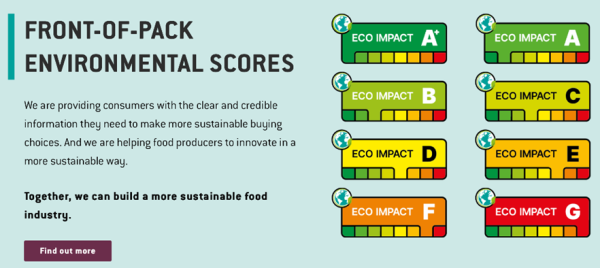Several global food manufacturers and leading UK supermarkets have become members of a new non-profit organisation that will issue front-of-pack environmental scores on food products from this September.
Foundation Earth is the brainchild of Denis Lynn, the Northern Irish food entrepreneur who died in May following a quadbike accident.
M&S, Sainsbury’s and the Co-op have joined Nestlé, Tyson Foods and Spanish supermarket Eroski on the Foundation’s industry advisory group, each signing up to “explore the potential for environmental labelling on food products and to support Foundation Earth’s ambition to help build a more sustainable food industry”.
A pilot launch will see a group of food brands in the UK launch front-of-pack environmental scores on a range of products this September, while Nestlé is funding a nine-month research and development programme to prepare the Foundation for full Europe-wide roll out in 2022.
Lynn’s firm Finnebrogue Artisan, which owns bacon brand Naked, is one of the first-mover food producers adding eco-scores to their products this Autumn, in advance of COP26.

The UN’s intergovernmental panel on climate change has warned the food industry already contributes up to 37% of global greenhouse gases and that, without intervention, these are likely to increase by another 30% by 2050, due to increasing demand from population growth.
Foundation Earth has brought together two leading systems for measuring the environmental impact of an individual food product and communicating the information clearly to consumers via a front-of-pack score. Its aim is to promote more sustainable buying choices from consumers and more environmentally-friendly innovation from food producers.
The Foundation’s pilot launch this Autumn will use a traffic-light style system developed by Oxford University, with the support of WWF.
The pilot will run in parallel to the research and development programme funded by Nestlé that will combine the Oxford method with a system devised by an EU-funded consortium of Belgium’s Leuven University and Spanish research agency AZTI.
The Oxford and EIT Food systems are unique in that they both allow two products of the same type to be compared on their individual merits via a complete product life cycle analysis, as opposed to simply using secondary data to estimate the environmental impact of an entire product group.
Experts say this method of individual assessment using primary data is crucial to encourage sustainable innovation in the international food supply chain.
The Foundation Earth R&D programme aims to produce a fully automated system for use across the UK and EU by Autumn 2022.
“Foundation Earth’s ambitions to develop eco-labelling on food has the potential to help address the urgent challenges of sustainability and climate change,” said George Eustice, the UK’s Secretary of State for Environment, Food and Rural Affairs.
“The Government continues to support the industry to become more sustainable, for instance through our funding for the Waste and Resources Action Programme and support for the Courtauld 2025 initiative, which aims to cut carbon, water and food waste in the food and drink sector.”
In a mark of the multi-national support for the scheme, Foundation Earth is also being backed by EIT Food, the European Commission’s multi-million Euro food innovation initiative.
Andy Zynga, chief executive of the EU funded food innovation initiative EIT Food, commented: “The launch of Foundation Earth is a very significant moment for the European food industry. It is the culmination of years of work from our EIT Food consortium and from the likes of Oxford University. It will bring about a credible and clear front-of-pack environmental labelling system on food products right across the continent.
“In supermarkets throughout the European Union, consumers are trying to make more environmentally-friendly choices – and food is at the heart of this. Foundation Earth has brought together the major players from the world of science, food production and retailing and will provide consumers with the tools to drive sustainable innovation.
“Supported by the European Union, EIT Food works to accelerate innovation to build a future-fit food system that produces healthy and sustainable food for all. Foundation Earth will help us do just this.”
Meanwhile, Johannes Weber, European Affairs Manager at Nestlé, said: “Nestlé is committed to building a more sustainable food system and providing consumers with the best information to make sustainable choices. These choices will drive the innovation we need to see across our food industry.
“This pan-European scientific project will help us to further develop the concept of communicating the environmental impact of our food and beverage products. Foundation Earth will provide us with the opportunity to test environmental footprint methodologies, learn how different products perform and establish how consumers respond. We hope this could help inform discussions in Europe with regards to a harmonised system for environmental scores.”



